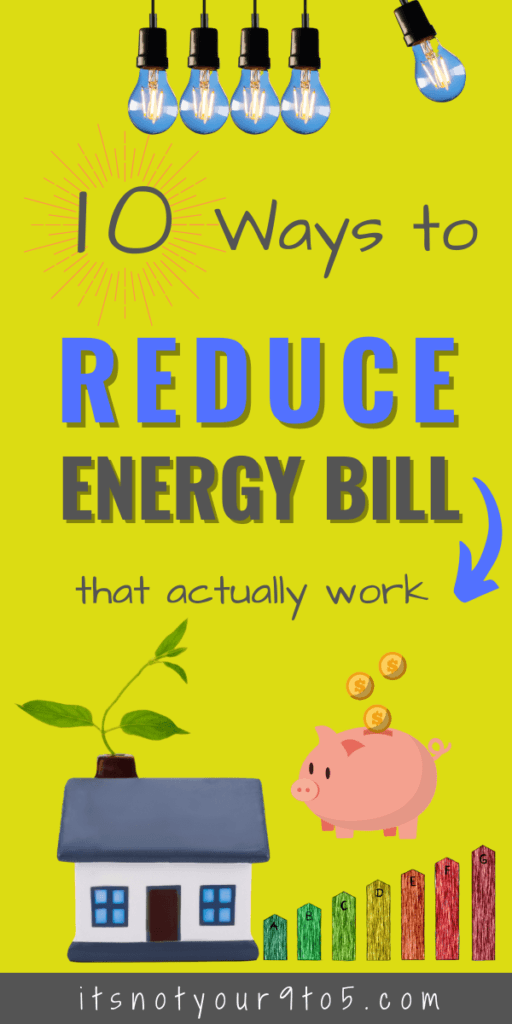Looking for effective ways to reduce energy bill for your household? [updated 2022]
You are looking in the right place.
According to the head of Ofgem, the United Kingdom’s energy regulator said that the annual bill for millions of households would likely rise to an eye-watering £2,800 ($3,494) later this year. [Source]
While the energy bill is one of the largest expenses for typical families, there are a lot of opportunities to save money.
With all the advice on how to save on energy bills out there, which ones get you the most savings?
In this post, I will be sharing with you what we have tried and worked as a family over the years – The Top 10 effective ways to reduce electric and gas bills. Some may require an upfront investment (while the payback can be offset by the savings long term), some are simply habit changes free of cost.
Disclosure: As an Amazon Associate I earn from qualifying purchases at no cost to you.
1. Switching energy provider
Out of all the ways to reduce energy bills, this one gets the best return for your effort.
Switching energy providers used to be a real pain and therefore no-one bothered. Well I didn’t after failed attempts to switch, leaving me paying twice and on endless calls with customer support centres.
Those days are over thanks to services like U-switch (that’s the one I use).
Last year we saved over £400 on our energy bills alone. U-switch has a simple and easy to use app, where you add your contract details and it does the hard work for you. Finding the best rates for you, at the best time for you to switch.
Top-tip – if you have or are getting a hybrid or electric car, make sure you check out tariffs with low cost energy for overnight charging. These rates can be less than a ¼ of the rate you pay during the day.
2. Use energy efficient appliances
Appliances are rated for efficiency, between A+++ (the best) and D being the worst. Replacing old appliances with A+++ can save you money. But how much?
Well, that depends on what you are replacing.
The top 4 energy consuming appliances are Fridge Freezers, Fridges, Tumble Dryers,, Dishwashers, then Washing Machines.
A house with A+++ rated appliances would save around £275 per year over a house with C or D rated appliances.
Therefore over the lifetime of the products the savings add up.
But be careful, I am not suggesting running out and replacing all your appliances, as the payback on the savings can vary between 5-10 years. My advice is, when choosing your new appliances, go for the best rating you can afford, and sometimes it’s worth paying that little extra, as it will pay you back in the long run.
Top tip
- By law, the sales assistants have to provide you with information on the most efficient machines if you ask them.
- Read the leaflets that come with these new appliances for energy-saving tips, such as washing at 20 deg C, setting the fridge and freezer temps for efficiency, washing and drying at night if you have a cheaper electricity rate between midnight and 5 am.
3. And don’t forget the little guys – the kettles
During the 11 years I lived in the US, I never owned a kettle. But the importance of a kettle for a UK household is equally as important as having a microwave, if not more, some may argue.
In the UK, this little kitchen device is boiled on average 725-1500 times a year, costing 2-4p each time depending on how much water is in there.
When we had our smart meter fitted, the installer used the kettle to show how the energy use spikes up when it’s on!
So, point One – only boil what you need. A full kettle would cost £30-60 per year, a half full kettle? You guess it – it’s half of the cost.
Point Two, next time you buy a kettle, go for the best energy efficient rating. Look for low watts (power), around 2000-2200W should be good. These then save you up to another 66% each time you boil.
iKich Glass Eco Kettle, £27.99 / $33.99, is one of the best value for money on the market.

So the £30 energy efficient kettle compared to the cheap £20 kettle, could actually make up the difference in less than a year. Combined with boiling what you need 🙂
4. Programmable thermostats
Programmable thermostats can save you money, but only if you use them correctly, and don’t constantly fiddle with them.
Programmable means you set the time the boiler comes on and off to heat your house. Which is great if you are a creature of habit and need the house at the right temperature at a specific time each day.
Smart Programmable, means your phone is connected to your thermostat using an app, giving you the freedom to control the time depending on how your day is going.
But how much can it save you?
Well, the answer is up to 30% of your energy bill, but obviously that depends on all the other factors in your house. Such as efficiency of windows, radiators, seals, insulation etc etc…see No.10.
The one that I highly recommend is Google Nest Learning Thermostat, 3rd Generation, £169.99 / $242.47

Top Tips (to get the best out of your thermostat)
- Understand how long your house takes to get to the temperature you like. This way you can set it up to be warm when you need it, without being on for too long.
- Don’t completely turn off the heating. Heating a very cold house back up to temperature actually uses more energy. I set ours to a minimum of 17 deg C during the colder months, then adjust the temperature to 20-21 deg C when we are in the house and awake, then back to 17 at bedtime.
- Don’t fight over the thermostat, constantly turning it up and down will cost you money.
5. Unplug appliances
So the next one on the list of ways to reduce energy bill is an easy hanging fruit. A simple habit change at no cost to yell an approx. $50 saving.
Unplug the appliances that are not frequently used.
Of course, things like your fridge, freezer, internet hub don’t make sense to unplug all the time, but others like computers, game consoles, TV, cable/satellite/freeview box, chargers and the microwave can be unplugged when not being used.
But can the extra effort actually save you money?
A study by Berkeley Lab suggests that 5-10% of home energy is consumed by appliances in stand-by mode.
So based on the average combined (Gas and Electric) UK home energy bill being around £1,289 per year (2019) and the electricity portion of that being £679, that 5-10% is a £34-68 saving per year.
6. Lights Off
Ok, I need a moment here.
I now sound like my father in-law who has us sitting in the dark when we visit. Even my kids ask why Grandad doesn’t let us put the lights on. He is from Yorkshire with Scottish heritage (that’s all I am saying).
But maybe he has or had a point!
With the old incandescent bulbs one single 100W bulb would cost £39 a year if used for 6 hours a day, or £154 a year if on 24 hours a day. Now count the number of bulbs, and that starts being a big number.
So one way to save on energy bills is to switch the lights off when possible.
BUT if you don’t like being in the dark to save money, there is an alternative way…
7. Switching to LED bulbs
By switching the old school incandescent bulbs to LED bulbs, can save on energy bills significantly, by up to 85%. So now a 15W LED bulb costs £5.75 per year if used for 6 hours a day, and £23 if on all day.
The LED bulbs are also 78% better than halogen, and 25% better than compact fluorescent.
So even if you are in a household with kids who constantly leave the lights on, it is not as costly with the LED bulbs. And if you can still remember to switch off, you can save even more…
8. Switch to energy-efficient showerhead
Generally a quick shower is cheaper than a bath as you use less water, therefore less energy to heat it. However power showers can actually use more water than a bath, even in a quick 5 min rinse.
I checked this by putting the plug in the bath and showing my 2 kids who normally bath together, sure enough the water was higher than our normal bath!
That’s where efficient shower heads come in, which use 20-30% less water. The trick is how the water comes out of the shower head – either pulsed, aerated or regulated. (My choice is aerated).
I have found it hard to determine the savings on this one, but which.co.uk had the following advice.
“To check whether you could cut your water usage, put a 2-litre container on the shower floor. If it takes less than 12 seconds to fill when the shower’s running on full, a low-flow or water-saving showerhead could benefit you.”
9. Air drying laundry
Tumble dryers are one of the most expensive appliances to run in your household.
According to energytrust.co.org, “line drying your clothes outside during the summer can save on average £30 a year on your electricity bill and 90kg CO2 in emissions.”
But what about for those cold and rainy days in the winter?
You can still air dry your clothes inside, near the radiator. An added benefit of drying clothes inside in the winter, it increases the humidity indoors which can avoid dry nasal passages that are more receptive to viruses.
In addition, air drying clothes will help your clothes last longer as it’s more gentle to the fabric. For even bigger causes, it reduces the carbon footprint thus, saving our environment.
10. Maintain your house for energy efficiency
Last but not the least, the top 10 ways to reduce energy bill is to keep your house energy efficient.
So the new appliances and smart controls can save you money, but you may as well throw that on the fire and watch it go up the chimney if you don’t maintain your house for efficiency.
So how to improve your house for energy efficiency?
Here are a few important things to consider…
- Block the chimney during the colder months, if you sit next to an open chimney you quickly feel the draft. This can simply be blocked off (WHEN NOT USING A FIRE) by card board or an old pillow. Then simply remove in spring.
- Seals around doors and windows, check the black seals around the doors and window frames are still in place and not hard and crumbly. If they are, simply replace with a new roll from any DIY store to stop draughts. Stopping draughts can save you £55 a year.
- Insulate, check you have insulation in the loft. Installing this can save you £175 a year off your energy bill. Wall insulation can also save £140, but requires someone to come and do that. But depending on your circumstances you may be able to get grants to help do this from the Government’s Green Homes Grants.
- Although this can be an expensive upfront investment, your old boiler may be worth replacing. 60% of your energy costs go through this. Meaning an A rated efficient boiler could save you up to £300 a year.
11. Underfloor heating
There are two main types of under-floor heating – electric and water.
Electric is easy and quick to install. However we recently found out after using the energy monitor supplied by our provider, every time it clicks on, the electric usage jumps straight to the red – high usage zone.
So if you have electric underfloor heating, don’t leave it on constant. Instead, use the programmer to schedule times. Reduce the temperature to a level that still works for you, but is at a minimum.
If you are considering underfloor heating, take a look at systems that use your central heating hot water – like your radiators. These are generally powered by gas or oil which is cheaper to run than electric. The initial installation cost might be a little higher, but in the long term, it will save you money.
Final thoughts on 10 + ways to reduce energy bill [that actually work]
Finding effective ways to reduce energy bill costs, is a great place to start saving money for your family.
The above 10 tips are what we have tried and worked as a family over the years, and will give you the most return for your effort.
Remember, energy efficiency = money saving.
When you have that in mind while running your household, not only you are saving money for your family, but also you are saving the environment we live in.
Related reads on ways to save money for your household:
10 ways to reduce energy bill that actually work [Pin it for later]

![You are currently viewing 10+ Ways to Reduce Energy Bill [that actually work]](https://itsnotyour9to5.com/wp-content/uploads/2020/09/ways-to-reduce-energy-bill-FB-1.png)

![Read more about the article How to Save Money Eating Out Effortlessly [for Your Big Family]?](https://itsnotyour9to5.com/wp-content/uploads/2020/07/how-to-save-money-eating-out-FB-1-300x200.png)

Hi Chloe,
Now that all the family has been staying home due to the pandemic, I have discovered that our bills have continually been going higher and higher. So it’s time to go on “save mode”. I think the first thing I will do is switching to LED bulbs. But I also appreciate all the list. Some we’ve been already applying.
Switching to the LED bulbs is definitely an easy hanging fruit as far as reducing your electricity bills go. All the best!
It’s hard to save energy when everyone’s been staying at home. Our electric bill has doubled since then, and we’re just using typical appliances. I appreciate these tips 🙂 Planning to try some of these. x
It’s so true, now that we are working from home so much, the energy bills can easily go through the roof especially in the coming winter. Definitely implement some of these energy-saving tips to save money this winter.